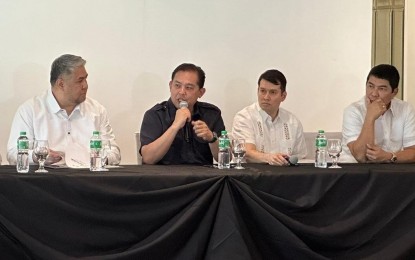
CONTINUOUS SUBSIDY. Speaker Martin Romualdez (second from the left) assures farmers that the subsidies in rice production would continue even with losses in revenues as a result of the tariff cut on imported rice during a meeting with representatives of government agencies and big supermarket operators at the Makati Golf and Country Club in Makati City on Thursday (June 6, 2024). Romualdez said Congress will provide the necessary funds to support farmers through the Rice Competitiveness Enhancement Fund (RCEF) amid the expected decline in tariff collection. (Photo courtesy of Speaker's office)
MANILA – Speaker Martin Romualdez on Thursday assured farmers that the subsidies in rice production would continue even with the expected decline in revenues as a result of the tariff cut on imported rice.
Romualdez made the commitment following his meeting with the Department of Agriculture (DA), Department of Trade and Industry (DTI), and the Bureau of Customs (BOC), as well as relevant stakeholders from the rice industry.
He said Congress will provide the necessary funds to support farmers through the Rice Competitiveness Enhancement Fund (RCEF) amid the tariff cut.
“Just from January to May this year alone, the Bureau of Customs had already collected PHP21.6 billion earmarked for subsidy to rice farmers. Government has enough resources to continue the subsidies, and Congress is ready to provide more funds if still needed,” Romualdez said.
Under RCEF, a PHP10 billion fund is allocated from tariffs to benefit farmers through mechanization, distribution of seeds, fertilizers, training, and technology, among others, with the excess collection allotted to the Rice Farmer Financial Assistance (RFFA).
Romualdez also allayed concerns that the reduction of rice tariff will flood the Philippine market with imported rice at the expense of locally-produced rice.
He said the reduced rice tariff is only meant to absorb price shocks in the world market and free-fall in foreign exchange.
“There is nothing to fear about massive importation. Our priority is still locally-produced rice. We only resort to importation only to offset our shortfall in rice production,” he said.
“This is just stop-gap measure and our goal is still rice-sufficiency and affordability,” he added.
Aside from the rice tariff cut, Romualdez said the bill amending the Rice Tariffication Law is another solution to help lower the price of rice.
Under the bill, the NFA shall be allowed to – in the following order – purchase local milled rice; purchase up to a maximum of 30 percent brought in by accredited importers at cost; and as a final recourse, once all domestic sources have been exhausted, directly import rice, subject to explicit authorization from the Agriculture Secretary.
“The reduction in tariff for rice is just one of the approaches. The expansion of Kadiwa stores is another. We are hopeful that the Senate will approve their version of the amendments to the Rice Tariffication Law which was passed by the House of Representatives last month,” he said.
Government officials who were present during the meeting include DA Undersecretary Christopher Morales, DTI Assistant Secretary Agaton Uvero, and BOC Deputy Commissioners Vener Baquiran and Clarence Dizon.
Speaker Romualdez was accompanied in the meeting by House Appropriations Committee Chairman Zaldy Co, Agriculture Committee Chairman Mark Enverga, and Deputy Majority Leader Erwin Tulfo.
The private sector was represented by SM Prime President Jeffrey Lim and Puregold President Vincent Co.
The board of the National Economic and Development Authority (NEDA), chaired by President Ferdinand R. Marcos Jr., has approved cutting the tariff on rice to 15 percent from 35 percent to bring down staple's price to PHP29 a kilo. (PNA)
 The Philippine News Agency is a web-based newswire service of the Philippine government under the supervision of the News and Information Bureau (NIB) of the Presidential Communications Office (PCO).
The Philippine News Agency is a web-based newswire service of the Philippine government under the supervision of the News and Information Bureau (NIB) of the Presidential Communications Office (PCO).